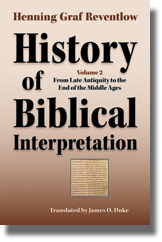
$32.00
From the very beginning, Holy Scripture has always been interpreted Scripture, and its interpretation determined the development and the history of both early Judaism and the first centuries of the Christian church. In this volume, the first of four on the History of Biblical Interpretation, readers will discover how the earliest interpreters of the Bible made the Scriptures come alive for their times—within the contexts and under the influences of Hellenism, Stoicism, and Platonism, as well as the interpretive methods developed in Alexandria. Particular attention is paid to innerbiblical interpretation (within the Hebrew Bible itself and in the New Testament’s reading of the Hebrew Bible), as well as to the interpretive practices reflected in the translation of the Septuagint and the writings of Qumran, Philo, the early rabbis, the apostolic fathers Barnabas and Clement, and early Christian leaders such as Justin Martyr, Marcion, Irenaeus, and Origen.
Henning Graf Reventlow is Professor Emeritus of Old Testament Exegesis and Theology, Faculty of Protestant Theology, University of the Ruhr, Bochum, Germany. He is the author or editor of numerous volumes, including The Authority of the Bible and the Rise of the Modern World (Fortress); Problems of Old Testament Theology in the Twentieth Century (Fortress); and Creative Biblical Exegesis: Christian and Jewish Hermeneutics through the Centuries (JSOT Press).
Click here for a printable publication sheet with table of contents that you can put in your files or give to your librarian or bookstore.
Click here to purchase the e-book edition.
